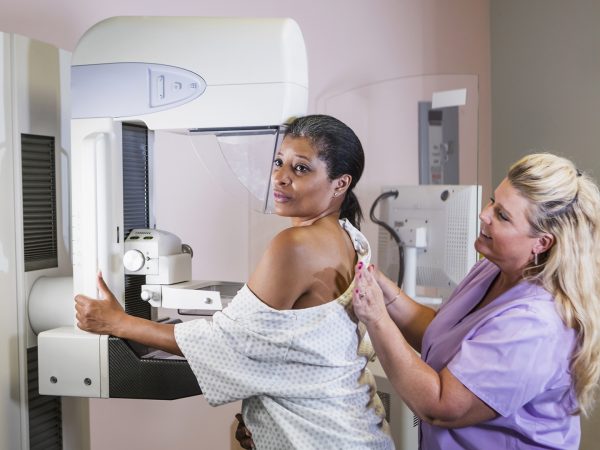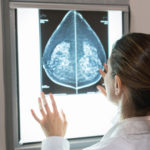Can The COVID Vaccine Affect A Mammogram?
My sister, age 41, recently got the COVID vaccine and then had a routine mammogram. Her result showed enlarged lymph nodes. Could this be caused by the COVID vaccine?
Andrew Weil, M.D. | June 21, 2021

It could. Both the Pfizer-BioNTech and Moderna vaccines have the potential to cause enlarged lymph nodes. Like redness, soreness, and the flulike symptoms some people have experienced, an enlarged lymph node is a sign that your immune system is mounting a response to the vaccine — in other words, your body is doing its job. Because the shots are administered in the upper arm, affected nodes are usually in the armpit of that arm. For instance, if you receive the vaccine in your left arm, one or more of the lymph nodes under that arm could swell.
This side effect wasn’t noted in studies of the Johnson & Johnson vaccine, but both Pfizer-BioNTech and Moderna reported it in their large trials. The risk seems to be higher with the Moderna vaccine: 11.6 percent of people reported enlarged lymph nodes after their first dose and 16 percent reported them after their second dose. Studies of the Pfizer-BioNTech vaccine identified this side effect in only 0.3 percent of people who received it.
If you develop an enlarged lymph node (also called lymphadenopathy) after being vaccinated against COVID-19, you can expect it to feel like a tender lump, which can last up to 10 days. This reaction is harmless, but it has caused alarm in some people. That’s because our lymph nodes can swell for other reasons, too —one of which is cancer (although that is usually not tender). As a result, some women who have developed enlarged lymph nodes have reached out to their physicians, and in turn, undergone mammography. The swelling can also potentially cause abnormal or false readings on mammograms, further adding to the unnecessary stress.
To address this concern, the U.S. Centers for Disease Control and Prevention (CDC) suggests asking your physician how long to wait after being vaccinated before having a routine mammogram. Some experts take it further than the CDC, recommending that women either schedule their mammograms before being vaccinated or wait about four to six weeks afterward.
In one paper, published earlier this year in the American Journal of Roentgenology, physicians at Massachusetts General Hospital urged their colleagues to take a pragmatic approach to screening enlarged lymph nodes. In hopes of easing patients’ anxiety and avoiding unnecessary testing, they recommended that physicians avoid further imaging if lymph nodes have shrunk within six weeks of the patient’s last vaccine dose. If enlarged lymph nodes persist after six weeks, an ultrasound of the breast and armpit might be warranted. Women who have recently been diagnosed with unilateral breast cancer should consider getting the vaccine in the arm on the other side or in their thigh to avoid confusion, the authors said.
I feel strongly that the benefits of the COVID vaccines well outweigh any risks, especially unpleasant but benign side effects. My recommendation: Get vaccinated, be mindful about the potential for its influence on your mammogram, and contact your physician if you have any concerns.
Andrew Weil, M.D.
Source:
“COVID-19 Vaccine: Can It Affect Your Mammogram Results?”, John Hopkins Medicine, hopkinsmedicine/health/conditions-and-diseases/coronavirus/covid19-vaccine-can-it-affect-your-mammogram-results, Published March 29, 2021.












